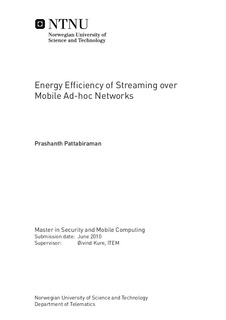Energy Efficiency of Streaming over Mobile Ad-hoc Networks
Master thesis
Permanent lenke
http://hdl.handle.net/11250/262299Utgivelsesdato
2010Metadata
Vis full innførselSamlinger
Sammendrag
Hand held mobile devices are widely used today primarily due to their rich functionality and the ease of portability. However, the battery life of these devices is very limited and deploying resource hungry applications such as streaming on these mobile devices is a challenging task. It is extremely important to maximize the efficient use of the contained resources on these devices especially when they participate in a mobile ad hoc network. The optimization can occur in any layer of the OSI stack, however, this thesis work focuses only on the routing protocols used in the network layer. In this thesis work we have been able to evaluate the Energy Efficiency of the four most widely used MANET routing protocols (AODV, OLSR, DSDV and DSR) in terms of their energy consumption and performance. The initial phase of the work was carried out using the Network Simulator 2(NS2) tool and later the observations were done on a real world MANET testbed. The influence of several external factors on the performance and energy consumption are also taken into consideration while performing the simulations and experiments. The results obtained from our observations provide both qualitative and quantitative analysis of the routing protocols. Furthermore, it also highlights how the behaviour of the protocols are sometimes highly unpredictable, yielding results that we may not expect.
